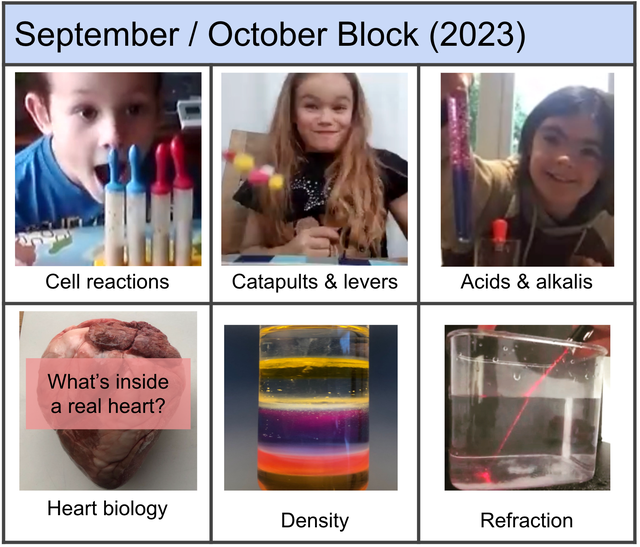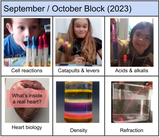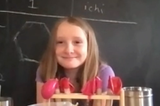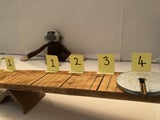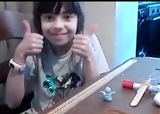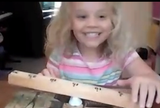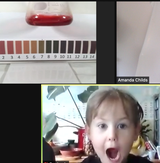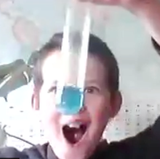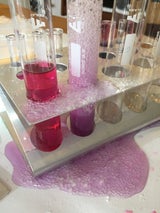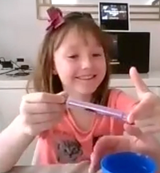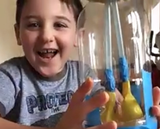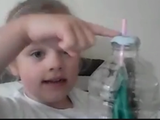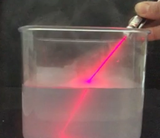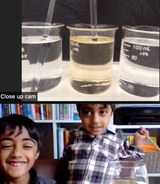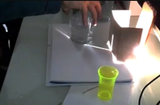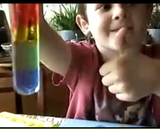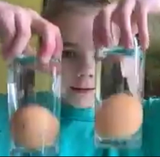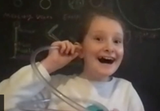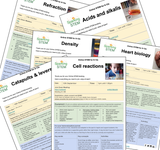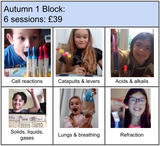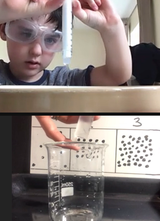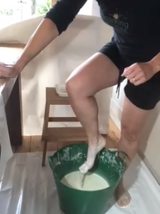- Online STEM
- >
- Online STEM: Sept / Oct for 8-12s (six sessions)
Online STEM: Sept / Oct for 8-12s (six sessions)
Tuesdays from 1pm to 1.50pm: (Online STEM)
Cell reactions: Blow up balloons with biology! (12th September)
Catapults and levers: (19th September)
Acids and alkalis, pH chemistry (26th September)
Heart biology: (3rd October)
Density: (10th October)
Refraction: (17th October)
Your home-education journal is already written!
Your booking confirmation will include a digital download containing joining instructions and link, equipment list and a summary of the keywords, key concepts and student activities planned for this session. You can simply copy, paste and adapt it for your home-education journal and use it to help you discuss the learning with your child afterwards.
------------------------------------------------------
Cell reactions: Blow up balloons with biology!
+ Conduct an experiment to investigate if yeast is alive!
+ See cells under the microscope and learn where cell reactions happen
+ Watch exciting demonstrations!
+ Learn about experimental design and the respiration equation
Equipment (To join an entirely optional practical)
It is a good idea to have a whiteboard or paper, pen, ruler and calculator to hand in each session.
- Dried yeast (approx 4 teaspoons)
- Small balloons
- Warm water
- Cold water
- Pipettes / Syringes / teaspoon
- Test tubes / boiling tubes / small bottles or other containers with a narrow neck (the balloons need to fit over the rim) (ideally four identical ones)
- Pen and paper
- Ruler (older groups)
- Stop watch (older groups)
- A funnel is useful
- Teaspoon
- Sugar (a few teaspoons)
What might younger students need help with?
Younger students might need help with measuring water and sugar, placing balloons over their tubes / bottles.
------------------------------------------------------
Catapults and levers:
Experience the power of levers!
+ Build catapults!
+ Experiment with the design to learn about levers, pivots and fulcrums
+ Watch exciting demonstrations!
Equipment (To join an entirely optional practical)
It is a good idea to have a whiteboard or paper, pen, ruler and calculator to hand in each session.
- Ruler (rigid / non- bendy) or similar piece of wood
- Coins (at least 10 of the same type)
- A pencil or pen
- A few elastic bands
- Teaspoon (ideally plastic or lightweight)
- A few lolly sticks, ideally large / jumbo ones
- Blue tack / plasticine / similar
- Full unopened tin of food (eg tin of beans)
- Metal kife (normal cutlery, not sharp)
- Glue stick or similarly thick cylinder shape
- Pom poms / cotton wool balls / tissue paper
- Calculator, paper and pen
What might students need help with?
Students might need help with elastic bands
------------------------------------------------------
Acids and alkalis: pH chemistry
Experience the colourful chemistry of pH!
+ Make your own pH indicator solution
+ Discover the colourful chemistry of acids and alkalis
+ Work out why toothpaste helps clean our teeth
+ Watch exciting demonstrations!
+ Learn about the pH scale.
Equipment (To join an entirely optional practical)
It is a good idea to have a whiteboard or paper, pen, ruler and calculator to hand in each session.
- Red cabbage, chopped small (about 5 tablespoons worth)
- Measuring (or similar) jug
- Boiling water (hazard: supervision required)
- Several spoons
- White plates / tiles
- Test tubes / boiling tubes / small glasses / small transparent jars
- Vinegar (colourless, “white” vinegar), red or malt won’t work so well.
- A range of safe household substances (ideally including as many of the following as possible: citrus juice, milk, bicarbonate of soda, water, lemonade, toothpaste, cleaning fluid / laundry detergent, antacid tablets)
- Several larger glasses or beakers or jars
- Eye protection recommended
- Pipettes / syringes / teaspoons
- A tray / table cloth to work on is a good idea
- Cloth for spills
Links suggest sources of appropriate resources
What might students need help with?
Students might need help with pouring liquids carefully, potential spills, using household substances safely and encouraging awareness of the hazards of some household substances.
------------------------------------------------------
Heart biology
Hear your heart beating and see inside a real heart!
+ Make a working stethoscope and hear your heart beating
+ Watch a live heart dissection (lamb’s heart)
+ Learn about the structure and function of the heart.
Please note that this session includes a live dissection of real organs
(lamb and possibly cow).
Equipment (To join an entirely optional practical)
It is a good idea to have a whiteboard or paper, pen, ruler and calculator to hand in each session.
- Plastic funnel (around 7cm diameter or similar)
- Balloon (rounded shape + spare)
- Scissors
- Duct / gaffa / tough tape
- Cardboard tube, eg. kitchen roll inner (or silicone tubing is better if you have it, the diameter should be sufficient to fit snugly over the spout of your funnel, and with a minimum length of about 30cm)
- No heart required! The dissection will be done live on screen during the session for students to watch, but you are welcome to get hold of a heart to join in with your own dissection at home if you would like to.
Links suggest sources of appropriate resources
What might students need help with?
Students may need support and preparation to view the dissection of real organs.
They may need help using tape and scissors carefully and accurately.
------------------------------------------------------
Density experiments
Learn all about what density is and how we can measure it!
+ Make a stunning density rainbow tower!
+ Watch exciting demonstrations!
+ Explain density with the particle model.
Equipment (To join an entirely optional practical)
It is a good idea to have a whiteboard or paper, pen, ruler and calculator to hand in each session.
- A tray or large plate might be a good idea
- 4 beakers or small cups
- Approx. 12 teaspoons of sugar (caster if possible)
- Warm water (take care near electronics, not hot)
- Four different food colourings
- Cloths to hand in case of spills
- A tall narrow transparent container (measuring cylinder, glass, boiling / test tube or similar)
- Pipettes or teaspoons
- Two spoons
- Two identical glasses or beakers of water
- Approx. 3 tablespoons table salt
- Two raw eggs or small tomatoes (these will be edible afterwards)
- Kitchen scales
- Measuring jug (needs markings) of water
- Marker pen
- Calculator
- Pen & paper / whiteboard & pen
Links suggest sources of appropriate resources
What might students need help with?
Students might need help with careful handling of liquids and being slow and gentle as they add their syrup.
------------------------------------------------------
Refraction: Bending light!
Bend light, split light, make rainbows and watch amazing optical illusions!
+ Bend light, split light and make rainbows!
+ Watch amazing optical illusions and exciting demonstrations!
+ Draw a ray diagram
Your home-education journal is already written!
Your booking confirmation will include a digital download containing joining instructions and link, equipment list and a summary of the keywords, key concepts and student activities planned for this session. You can simply copy, paste and adapt it for your home-education journal and use it to help you discuss the learning with your child afterwards.
Equipment (To join an entirely optional practical)
It is a good idea to have a whiteboard or paper, pen, ruler and calculator to hand in each session.
- A drinking glass or beaker (not bowl shaped or patterned). Take care with glass.
- Water (take care near electronics)
- A rounded wine glass (colourless glass) filled with water (take care near electronics, young children may need supervision)
- An A4 ish, white piece of card / paper and something to lean it against to give a vertical, white surface.
- A range of transparent objects (glasses / jars, lenses, dishes, anything!)
- Paper and pen
- A piece of stiff, thin card
- Scissors
- Torch (a phone torch is best, with something to prop it up against)
- The experiments will be more effective if you can darken the room.
Links suggest sources of appropriate resources
What might students need help with?
Students might need help with handling glass and water carefully. They may also need help cutting card neatly.
------------------------------------------------------
Price is for one device (screen) to join for six sessions.
Upon booking you will receive a digital download (available for one year) with joining instructions and links, equipment lists, home-ed journal texts and registration form link (for photography consent form and opportunity to let us know any relevant needs),
By booking you are agreeing to read and abide by the Privacy policy, safety and cancellation policies (Opens in a separate window).
